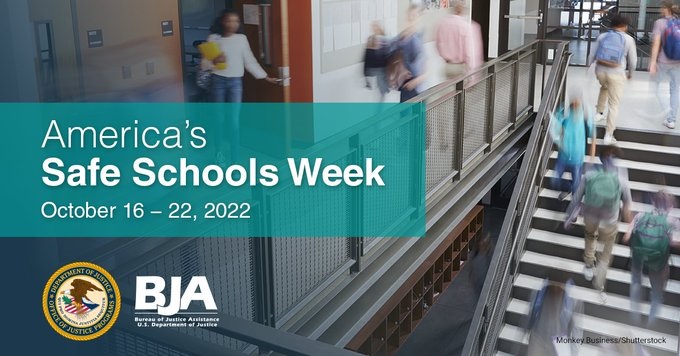Archival Notice
This is an archive page that is no longer being updated. It may contain outdated information and links may no longer function as originally intended.
This week is America's Safe Schools Week, when we highlight ways in which law enforcement, policymakers, students, parents, and community residents can work to achieve greater school safety. The Bureau of Justice Assistance (BJA) works to ensure students are safe at school through BJA's Student, Teachers, and Officers Preventing (STOP) School Violence Grant Program, which currently funds 460 agencies to implement safety measures in schools nationwide.
STOP is designed to improve school security by providing students and teachers with the tools they need to recognize, respond to, and help prevent acts of violence. BJA funds the University of Michigan School of Public Health to provide research and training on school safety to all our STOP grantees. The National Center for School Safety (NCSS) at the University of Michigan brings together faculty and staff from top schools of public health, criminal justice, education, school safety, law enforcement, crisis intervention, violence prevention, mental health, and experts in evidence-based practices to address school-based violence.
"Working with STOP grantees, we have identified three areas in which practitioners want to increase their knowledge: trauma-informed approaches, behavior threat assessments, and school climate," said Emily Torres, program manager at NCSS. "We've developed training in each area and more. By examining multiple key areas, we can look at school safety comprehensively, because we know there is not just one way to keep schools safe."
Ms. Torres and her team worked with staff at Purdue University to implement the Second Step: Bullying Prevention program. This antibullying curriculum aims to improve school safety by creating a positive school climate and culture where everyone feels safe and respected. The program is currently being implemented at 48 rural and high-poverty schools in Indiana. The curriculum includes age-appropriate instruction for K-5 students and helps schools develop and implement a school-wide bullying prevention program through reporting documents and policies to ensure a bully-free culture. The Second Step curriculum is research-based and teaches everyone, from administrators to children, the definition of bullying, responsive strategies, and reporting procedures. This program empowers kids who are bystanders to stand up for others.
"The great thing about STOP is the focus on prevention. A positive school climate can significantly decrease the likelihood of crime, aggression, and violent behavior." —Emily Torres, NCSS program manager
NCSS also provides resources for mental health professionals, school personnel, and parents. To learn more about how BJA supports school safety and to access school safety resources, visit the STOP section of the BJA website.




